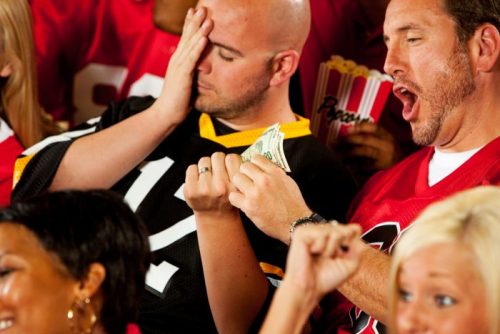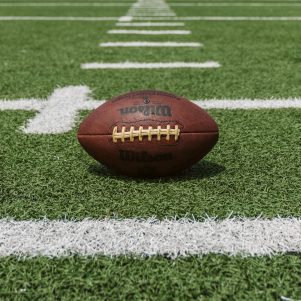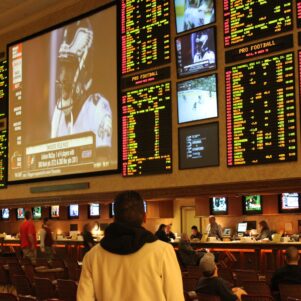Wanna Bet? Getting Ready for Sports Gambling in Massachusetts
By State House News Service | December 7, 2017, 18:43 EST

By Colin A. Young
STATE HOUSE NEWS SERVICE
BOSTON — Anticipating that the U.S. Supreme Court might rule next year that states can legalize sports wagering, the Massachusetts Gaming Commission on Thursday resolved to prepare research on the topic for lawmakers who may have to decide whether sports betting fits into the gaming environment in Massachusetts.
The commission’s executive director said his staff will take a “cautious proactive approach” to educating the commission, the Legislature, and possibly the governor on the issue of sports betting and the U.S. Supreme Court case that could make placing a bet on a professional sports game legal.
“The outcome of this case could — and if I could show you my paper ‘could’ is in capital letters — have implications for the potential of legalized sports betting in Massachusetts,” Gaming Commission Executive Director Edward Bedrosian said Thursday.
Bedrosian said Gaming Commission staff will develop a whitepaper, similar to one the commission released about two years ago when daily fantasy sports had exploded into the public consciousness, for the Gaming Commission to discuss after the Christmas holidays.
The case in question is Christie v. National Collegiate Athletic Association, brought by the state of New Jersey challenging the Professional and Amateur Sports Protection Act, which limits which states can offer legal sports betting. The U.S. Supreme Court heard oral arguments Monday on the case from powerhouse attorneys Ted Olson and Paul Clement, both former U.S. solicitors general.
“We feel really good about our argument. We don’t see that there is any basis for the federal government to be able to tell the states that you have to do or not do certain things,” New Jersey Governor Chris Christie told WFAN’s Mike Francesa in late November. “From our perspective, this should be a choice for the people of New Jersey. They’ve spoken in a referendum, the Legislature passed a law, I signed it, and we think the Supreme Court is going to back the right of the states to do what they think is best in this area.”
Massachusetts Attorney General Maura Healey’s office is following the Supreme Court case, a spokesman said. Healey, an opponent of casino gaming, has advocated a cautious approach to further expansion of gambling as Massachusetts works to bring casinos authorized under a 2011 law on line starting next year.
If the federal high court rules that states are free to legalize sports betting, the decision to do so would belong to the Massachusetts Legislature and Governor Charlie Baker. With that in mind, Bedrosian said the Gaming Commission could be helpful by assembling information on the case, the current betting landscape, and how other states are positioning themselves to take wagers.
“If the Supreme Court decided this case in a way that allowed individual states to legalize sports betting, there are many issues that would need to be decided,” Bedrosian, a former first assistant attorney general, said. “First, obviously, whether to legalize sports betting, what’s the appropriate tax rate, who is the regulator, who decides the number of licenses, who gives them, how sports betting could be accessed whether in person or online. These are just a few.”
Gaming Commission chairman Stephen Crosby said he thinks it is important for the commission to share its expertise with the Legislature, and suggested that the commission’s white paper provide “a sort of lay of the land today and lay of the land under each of the different outcomes” of the Supreme Court case.
“There are a lot of states teeing this up and if there is a competitive consideration we ought to at least give the Legislature enough of a heads-up with enough time that if they wanted to prepare, sort of, or at least have some committee that knew what was going on, they have time to do that,” he said.
On Beacon Hill, where lawmakers and the Baker administration have been coping with sluggish tax revenue growth, the idea of legalizing sports betting has not been in play, although it did surface in the 2009-2010 race for governor.
In 2009, Republican gubernatorial candidate Christy Mihos came out in favor of legalizing wagers on professional and college sports, saying the industry could boost the sagging state Lottery and flush cities and towns with over $1 billion annually.
Earlier this year, a UMass Lowell-Washington Post poll found that 55 percent of Americans support making gambling on professional sports legal in all states and that one in five people surveyed had placed an illegal bet. Thirty-three percent of respondents disapproved of allowing gambling on professional sports in all states, and another 12 percent had no opinion, according to the poll.
Christie said he expects the Supreme Court to hand down its ruling “at the earliest … before April but probably closer to June,” and Gaming Commissioner Lloyd Macdonald stressed that the court’s ruling may not be as clear as deeming sports betting legal or illegal.
“I would underscore the word ‘cautious’ as being the characterization or approach. Although it appears the betting is that New Jersey is going to win, from prior experience it’s very difficult to predict with any confidence what a court is going to do,” Macdonald, a retired judge, said.
Amy Howe, a reporter writing for the website SCOTUS Blog, reported Monday that after an hour of arguments, “a majority of the justices seemed inclined to agree with New Jersey.”
PredictIt, a website that calls itself a “real-money political prediction market” and allows users to buy ‘stock’ in various predictions, was taking bets on the outcome of Christie v. NCAA on Thursday.
One share of a “Yes” prediction that the court will rule against a federal sports betting ban was trading for 83 cents Thursday afternoon. If the court sides with Christie and New Jersey, all shares pay out $1.











